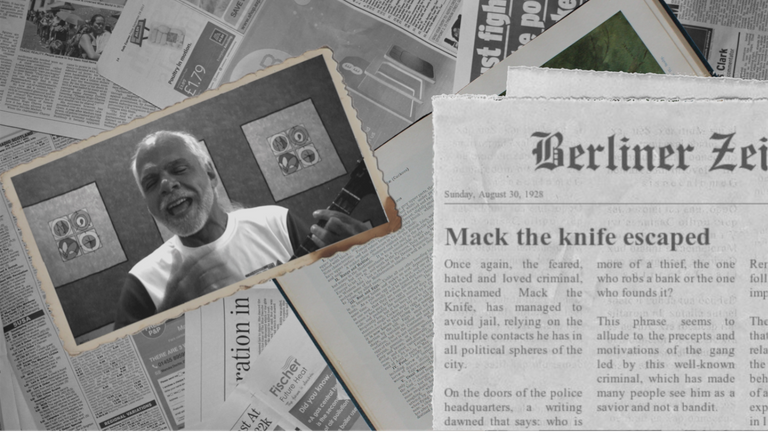For my father, who was a researcher and teacher of theater arts, Bertolt Brecht was one of the most admired theorists, playwrights and theater directors. During our stay in Germany, visits to the Berliner Ensemble were recurrent and he maintained a direct relationship with the group and with Helene Weigel, who was the last wife of this theatrical creator and whom my father met in 1958.
The music of his plays, which always had very particular characteristics, was always heard in my house with insistence.
The Threepenny Opera, was one of the most emblematic plays written by Brecht and set to music by Kurt Weil. Premiered in 1928, it became an immediate success, until 1933, when the Nazi party triumphed, and Brecht and other members of the group had to leave the country, as they were accused of being communists.
But by that time the play was already a success in different countries, with a number of translations of the piece. But beyond its achievements, its songs also became popular very soon and this one, which is the presentation of the protagonist, stood out above the rest until it became a jazz standard, and was recorded by the greatest stars of all times.
Moreover, in the case of my family, there is an additional anecdote. My dad, at some point in his life, had the idea of singing the lyrics of a Venezuelan Christmas carol, known as "Tucusito, tucusito", with the melody of this song and that became a hallmark, because it was so absurdly funny, that everywhere (I mean parties and celebration environments) he ended up singing it.
If there is a song that has been present in every moment of my life, it is this one, whose original title is Die Moritat von Mackie Messer. That first word, although it refers to an ancient form of singing, has been translated as ballad, so that it makes sense and is easy to understand. Therefore, in Spanish it has been titled "La balada de Mackie el Navaja" (The Ballad of Mackie the Knife). But thanks to the many recordings that have been made, it became popularized as Mack the Knife.

Para mi papá, que fue un investigador y docente de las artes teatrales, Bertolt Brecht fue uno de los teóricos, dramaturgos y directores de teatro más admirado. Durante nuestra estadía en Alemania, las visitas al Berliner Ensemble eran recurrentes y él mantenía una relación directa con el grupo y con Helene Weigel, quien fue la última esposa de este creador teatral y a quien mi papá conoció en el año 58.
La música de sus obras, que siempre tuvo unas características muy particulares, siempre se escuchó en mi casa con insistencia.
La Ópera de Tres Centavos, fue una de las obras más emblemáticas escitas por Brecht y musicalizada por Kurt Weil. Estrenada en 1928, se convirtió en un éxito inmediato, hasta 1933, año en que triunfa el partido nazi, y Brecht y otros miembros del grupo tienen que salir del país, ya que eran señalados de comunistas.
Pero para ese momento ya la obra era un éxito en distintos países, con cantidad de traducciones que se habían hecho de la pieza. Pero más allá de los logros de la obra, también sus canciones se popularizaron muy pronto y esta, que viene a ser la presentación del protagonista, destacó por encima de las demás, hasta convertirse en un estándar del jazz y haber sido grabada por las más grandes estrellas de todos los tiempos.
Además, en el caso de mi familia hay una anécdota adicional. Mi papá, en algún momento de su vida, tuvo la ocurrencia de cantar la letra de un villancico venezolano, conocido como "Tucusito, tucusito", con la melodía de esta canción y ese se convirtió en un sello, porque resultaba tan absurdamente gracioso, que en todos lados (me refiero a fiestas y ambientes de celebración) terminaba cantándola.
Si hay una canción que ha estado presente en todos los momentos de mi vida, es esta, cuyo título original es Die Moritat von Mackie Messer. Esa primera palabra, aunque se refiere a una forma de canto muy antigua, se ha traducido como balada, para que tenga sentido y de fácil comprensión. Por lo tan, en español se ha titulado como "La balada de Mackie el Navaja". Pero gracias a las múltiples grabaciones que se han hecho, se popularizó como Mack the Knife.

Lyrics || Letra
Und der Haifisch, der hat Zähne
Und die trägt er im Gesicht
Und Macheath, der hat ein Messer
Doch das Messer sieht man nicht.Und es sind des Haifischs Flossen
Rot, wenn dieser Blut vergießt
Mackie Messer trägt ’nen Handschuh
Drauf man keine Untat liest.An der Themse grünem Wasser
Fallen plötzlich Leute um
Es ist weder Pest noch Cholera
Doch es heißt: Mackie geht um.An’nem schönen blauen Sonntag
Liegt ein toter Mann am Strand
Und ein Mensch geht um die Ecke
Den man Mackie Messer nennt.Und Schmul Meier bleibt verschwunden
Und so mancher reiche Mann
Und sein Geld hat Mackie Messer
Dem man nichts beweisen kann.Jenny Towler ward gefunden
Mit ’nem Messer in der Brust
Und am Kai geht Mackie Messer
Der von allem nichts gewußt.Wo ist Alfons gleich, der Fuhrherr?
Kommt er je ans Sonnenlicht?
Wer es immer wissen könnte
Mackie Messer weiß es nicht.Und das große Feuer in Soho
Sieben Kinder und ein Greis
In der Menge Mackie Messer, den
Man nichts fragt, und der nichts weiß.Und die minderjähr’ge Witwe
Deren Namen jeder weiß
Wachte auf und war geschändet
Mackie welches war dein Preis?

Video footage || Videos complementarios
[1] - [2] - [3] - [4] - [5] - [6] - [7] - [8] - [9] - [10] - [11]
Image 1 - Image 2
Newspaper || Periódico


Vote la-colmena for witness
By @ylich
http://ylich.com
https://sptfy.com/ylich
Buy Ylich's "Pa' los bailadores" NFT at nfttunz.io
▶️ 3Speak

